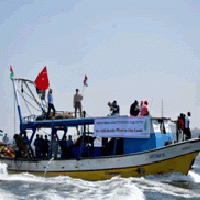
Tuesday, September 20, 2016 | by CrethiPlethi Staff
Statement
by
the President
of the Arab Republic
of Egypt
before the
71st Session of the
United Nations General Assembly

Abdel Fattah Al Sisi, President of the Arab Republic of Egypt, addresses the general debate of the General Assembly’s seventy-first session, 20 September 2016, United Nations, New York. (Source: UN Photo/Manuel Elias)
In the name of Allah the compassionate and merciful…
Mr. Peter Thomson
Allow me to congratulate you on assuming the presidency of the General Assembly in its seventy-first session, and wish you success in this position. I would also like to express my gratitude to Mr. Mogens Lykketoft, the president of the previous session, for his efforts and contributions.
Mr. President,
The current session of the General Assembly comes in the wake of our launching of a new phase in the strive towards comprehensive sustainable development, with its environmental, economic, and social dimensions, after our adoption of the 2030 Sustainable Development Agenda and the Addis Ababa Action Plan for the financing of development during the previous year. The aspirations of peoples, particularly in the developing world, for a suitable standard of living and constant progress is doubtlessly our primary responsibility as leaders entrusted by our peoples with these goals, in line with the principles of humanity that guide us all. However, the challenges that face developing countries, coupled with the limited capabilities at their disposal, prevent the realization of the level of ambition displayed in the agenda. Developing countries are not afforded a sufficient opportunity to achieve sustainable development; they require a conducive international environment which provides them with a larger share of international trade, finance mechanisms, and transfer of technology, as well as influx of investments and debt settlement, in addition to the necessity of a conducive national environment for development.
Egypt calls for the support of the role of the state, in order to guarantee a balance between the different dimensions of sustainable development, particularly in relation to the effectiveness of social security networks, and advancement of national ownership of development. Egypt also stresses the importance of harnessing the global monetary system to establish a fair global economic system, one that provides equal opportunities for development and contributes to minimizing the gap between developed and developing countries. The United Nations is the ideal platform to address this issue. Accordingly, Egypt was among the first 22 states to present a voluntary review of its developmental plans last July.
Last year we reached an agreement based on the principles of the United Nations Convention on Climate Change. As the coordinator of the group of African leaders on climate change, I affirm Africa’s commitment to confronting climate change within its abilities, and its aspiration towards putting into practice the implementation mechanisms of the agreement pertaining to transfer of technology and sustainable financing. As such, Egypt has established the track for the Renewable Energy Initiative and presented it in the context of its presidency of the committee of African leaders concerned with climate change, in implementation of the relevant African Union resolutions. Egypt highlights the importance of this Initiative in providing support to Africa. Efforts to confront climate change must take into consideration equity and the right to development, as well as adherence to the principles of international law, the importance of universal benefit, refraining from harm, enhancing cooperation, and the participation of different countries in the prospective projects, in accordance with the rules that regulate international financial institutions headed by the World Bank.
Mr. President,
The world has become a global village as a result of the positive impact of the communications technology revolution, as well as the freedom of capital flow and investments and global trade. However, we continue to see another side to globalization, one that has produced a number of social and economic challenges. Globalization has been linked to a rise in poverty, the expansion of the inequality gap, and the undermining of the social contract in a number of developing countries, and these factors combined have exerted pressure on the institutional cohesion of these countries. Perhaps these challenges and pressures constitute the biggest incentive for the international community to work diligently to provide state institutions in all countries with the best possible means to undertake their responsibilities and meet the needs and aspirations of their peoples.
In the midst of these challenges facing the international order, the Egyptian people have succeeded in enforcing their will to achieve stability, to protect the state and its institutions, and even to safeguard the society from fragmentation and chaos. The Egyptian people approved a new constitution that enshrines the rights and freedoms outlined by the Universal Declaration of Human Rights, a constitution that establishes equality on the basis of citizenship, and consolidates protection for vulnerable groups, paving the way for women to occupy 15% of seats in the House of Representatives and expanding the representation of youth within it. That House of Representatives is now active in practicing its legislative authority as well its oversight responsibilities over the executive authorities. On the economic front, Egypt is steadily moving forward in implementing an ambitious plan for economic reform which takes into account social considerations and the requisites of a decent livelihood for the Egyptian people. Egypt is also implementing giant national projects aiming to expand the road network and establish electrical and renewable energy stations, as well as developing the country’s infrastructure and industrial capabilities, and expanding agricultural territory.
Mr. President,
While the Middle East continues to suffer from bloody conflicts, Egypt has managed to preserve its stability in the midst of a highly unstable region, thanks to the solidity of its institutions and its people’s awareness of their great cultural heritage. The international community must acknowledge and support this fact, to the benefit of the region and the world at large, so that Egypt may continue to act as an anchor of stability in the Middle East, sparing no efforts in carrying out its natural role by working with regional and international parties to restore security and stability in the region.
At the forefront of the bloody conflicts plaguing the region, the agonizing situation that Syria suffers has continued for six years, resulting in hundreds of thousands of deaths and turning millions more into internally displaced and refugees both within their homeland and in neighboring countries. Amongst them are half a million Syrians which Egypt has welcomed as brothers and sisters, treating them as Egyptians in terms of providing healthcare, education, and housing. The bloodletting in Syria and the absence of any prospects on the horizon are no longer acceptable. What is necessary is clear: an immediate and comprehensive halt to all hostile acts across all of Syria, paving the way for a political solution that ends the bloodshed and preserves the territorial integrity and security of Syria and its state institutions, as well as realizing the aspirations of the Syrians, and putting an end to the chaos that has only served to facilitate the spread of terrorism. In this regard, we welcome the latest agreement for cessation of hostilities that was reached as a result of commendable efforts exerted by Russia and the United States, and we aspire towards swift and serious international action to resume negotiations as soon as possible, in order to reach a comprehensive settlement to the crisis.
Within the same context of our troubled region, the Arab-Israeli conflict continues to be the core of regional instability in the Middle East, necessitating joint efforts by the countries of the region and the international community to reach a final and comprehensive solution to the conflict. Egypt continues to pursue its utmost efforts to achieve peace in the region and end the Israeli occupation through negotiations and progress in the peace process, in order to reach a final settlement and sustainable and just peace on the basis of the two-state solution. We thus welcome current efforts based on a genuine desire to improve the situation in the Palestinian territories, as the Palestinian people continue to suffer in a state of affairs that must be rectified, with a focus on ending the occupation and reclaiming the rights of the Palestinian people via a peace agreement consistent with the resolutions of international legitimacy, one that guarantees the Palestinians’ right to their own state and achieves security for Israel within the context of normal relations in its region.
Egypt affirms that the hand of peace remains extended in the form of the Arab Peace Initiative, and stresses the necessity of working to take constructive steps to end Israeli settlement-building and initiate negotiations for the ultimate resolution, while simultaneously halting all acts that bring harm to the Arab heritage in Jerusalem.
In a situation with direct implications on Egyptian national security, Libya is currently witnessing a dire juncture, and a deep political crisis. Despite the progress we achieved last year through the signing of the Sukhirat agreement, its implementation continues to face difficulties. Egypt is playing an active role in bringing the Libyan parties together and supporting the implementation of the agreement as a means of regaining the unity and authority of the Libyan state over its territory, allowing it to operate via its legitimate institutions, represented by the Presidential Council, the National Unity Government, the House of Representatives, and the National Army. Egypt also hosts the meetings of our Libyan brothers to facilitate the implementation of the Sukhirat agreement, as well as the establishment of a National Unity Government representing all Libyans and its ratification by the House of Representatives, so that it may focus on reconstruction, in turn allowing the Libyan army to focus on combating terrorism. In this regard it is necessary to lift the arms embargo imposed on the army. There is no place for terrorism and militias in Libya; the time has come to restore the institutions of the Libyan state.
In Yemen, Egypt is exerting every effort to support Yemeni territorial integrity and security, and the return of the legitimate government. We support the efforts of UN envoy Ismail Ould Sheikh, and his plan to resolve the crisis, which has been approved by the legitimate government in an effort to prioritize national interest. We stress the importance of resuming negotiations, and for all parties to declare their commitment to the UN envoy’s plan to reach a comprehensive settlement in Yemen in accordance with Security Council resolutions, most importantly resolution 2216. Egypt will continue to support efforts for a solution and for providing humanitarian assistance to our Yemeni brothers and sisters, in addition to our fundamental role in securing maritime navigation in Bab A1-Mandab and the Red Sea.
The majority of these Arab crises are a reflection of a global state of conflict, and I must iterate Egypt’s rejection of any foreign interference in Arab affairs. I would like to affirm our commitment to the principle of good neighborliness, stressing Egypt’s solidarity with Arab states in facing foreign interventions, in light of the link between Arab security, including the security of the Arab Gulf, and Egyptian national security. I would also like to underline the importance of resisting any attempts to foment sectarian strife in the Arab world.
Mr. President,
With equal commitment, Egypt shoulders its responsibility towards the security and stability of Africa. Egypt is currently the President of the African Peace and Security Council, and in this capacity is focusing on enhancing cooperation between the African Union and the United Nations with regards to growing transnational threats, including terrorism and organized crime. We aim to bring about a shift in addressing conflicts, on the basis of the principle of “national leadership and ownership” to ensure the success of peace-building efforts. Through its memberships in both the African Peace and Security Council and the UN Security Council, Egypt has been keen to enhance coordination between the two bodies, which has had a positive impact on African issues in the Security Council, issues that Egypt has placed at the forefront of its priorities as president of the Council.
Egypt has sought to support the peace and security architecture in Africa, and particularly efforts to operationalize the African Standby Force. Egypt has also increased its participation in UN peacekeeping missions in the region, regaining its place as one of the 10 largest contributors to said missions. Egypt calls for the adoption of a comprehensive counterterrorism strategy, via an approach that is not limited to the security aspects, but includes the ideological aspects as well, and as such, Egypt will host the CENSAD counterterrorism center. Egypt would also like to highlight the importance of assessing any arising sources of tension, taking into consideration the phenomena of desertification and water scarcity, and the developmental needs related to managing transnational boundaries water resources.
Mr. President,
With regards to situations in our African continent, Egypt stresses the necessity of providing the Somali government with support in order to conclude elections during the current year.
In Burundi, Egypt seeks to find solutions to the political crisis via the African Peace and Security Council, and more so via the Security Council. We are working to address the crisis in the appropriate manner, in order to defuse the political situation and allow all of the Burundian parties to intensify peaceful political dialogue, averting the use of violence.
Egypt has also sought to participate in the regional framework to address the crisis in South Sudan ever since its inception, engaging with the parties of the conflict as well as regional and international parties to achieve peace. Through its current presidency of the African Peace and Security Council, Egypt seeks to increase the role of the Council in this regard, as well as to enhance cooperation with the joint monitoring and assessment mechanism. Egypt calls for all parties to work within the transitional government of national unity of South Sudan, with the aim of restoring peace to Juba.
Regarding the Republic of Sudan, Egypt commends the efforts exerted by the Sudanese government, which have resulted in the signing of the roadmap proposed by the High-Level African Union Mechanism in April.
Mr. President,
The phenomenon of terrorism, and the hostility towards the right to life it represents, has become an urgent threat to international peace and security. Terrorism constitutes a threat to the entity of the state, in favor of an extremist ideology that utilizes religion as a veil from behind which to conduct monstrous acts and menace the destinies of peoples. This necessitates intensive regional and international cooperation. Egypt has always been keen to stress that the endeavor to defeat terrorism will never achieve its ends unless we address the roots of the phenomenon, confront terrorist groups with decisiveness, and refute the extremist ideologies that give birth to terrorism and its proponents.
Egypt calls upon the international community to take all possible measures to prevent terrorism from exploiting advances in information technology, which have contributed to endowing the phenomena of terrorism and ideological extremism with dangerous new dimensions that have granted them global reach. It is essential to end the broadcasting of channels and the hosting of websites that incite violence and extremism.
Mr. President,
The world is at a crossroads; threats to international peace and security are no longer conventional, but have rather evolved to constitute a threat to the very tenets of human civilization. In the same vein, the challenges we face, be they humanitarian, environmental, economic, developmental, or health-related, are no longer confined by international borders, but have rather become global, rendering inappropriate the practices of ideological patronization and monopolization of science and knowledge.
In this regard, I would like to point out that the Constitution of The United Nations Educational, Scientific and Cultural Organization (UNESCO), stated that “war begins in the minds of men” and thus that it is “in the minds of men that the defenses of peace must be constructed”, I assert before you today that the cancer of our age is the terrorism that breeds the call for extremism and violence in the minds of people. Accordingly, it is our duty to instill in those very same minds the principles of tolerance and coexistence.
If culture is the reflection of the principles by which mankind lives, then we must employ culture, technology, and knowledge for the benefit of development and peace. As such, I call on the United Nations to give greater attention to addressing the cultural aspects of development and peacemaking, and the elimination of destructive ideologies, including via access to knowledge, transfer of technology, and confronting extremist ideologies. This must be undertaken in partnership with UNSESCO, an organization the role of which has grown vastly in importance in today’s world. Egypt recognizes the everincreasing importance of this role, and the importance of taking utmost advantage of the organization with a view to achieving a better, safer, and more understanding world in which there is room for all.
Mr. President,
It is mankind’s obligation to reclaim the essence of our humanity, sharing knowledge and technology without monopoly, and uniting in the face of challenges. Just as it has always been an eternal accumulation of civilizations, Egypt presents these ideas as the cradle of human civilization. And on this positive note, I reaffirm before you today Egypt’s commitment to continuously contributing to coexistence within the international family, and the strive for a more secure and prosperous world for our future generations.
Thank you, Allah’s peace and blessings be upon you.



 RSS
RSS










Latest Comments
Hello Mike, Thank you for your positive feedback to the article. I felt there wasn’t too much critical analysis of ...
Thanks for this considered and well constructed article. A follow up article on the manner in which the editorial contro...
THE CLUELESSNESS OF CLAIMING THAT OBAMA'S MIDDLE EAST POLICIES WERE A FAILURE CANNOT BE FURTHER FROM THE TRUTH, WHAT THE...
As long as Obama is the president of the usa do not trust the us government......
Thank you for an good read....